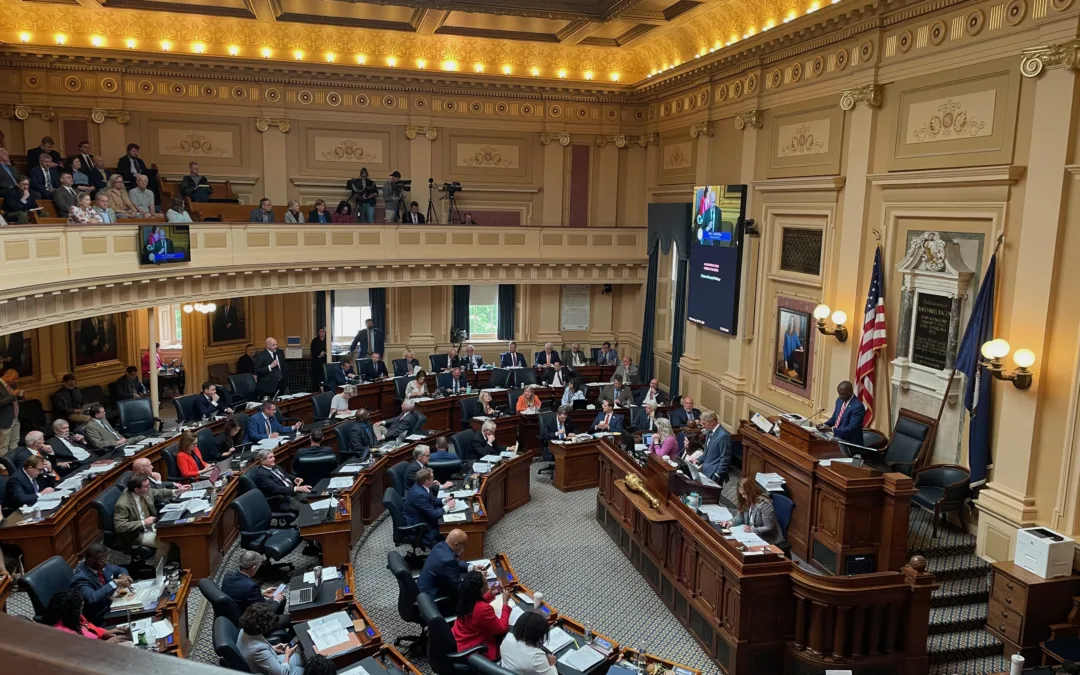
Sen. Warner’s bill looks to help abuse survivors who, under current law, pay their domestic abuser’s student loans.
WASHINGTON, D.C. – Domestic abuse survivors in Virginia sometimes end up paying for their abuser’s student loans, thanks to a nearly 30-year-old law. It’s a situation Sen. Mark Warner and others hope to fix.
“Many partners have, in a sense, joint consolidation of their debts,” Warner said. “And one of the areas where that joint consolidation took place was around student debt.”
Nearly 30 years ago, a federal law passed allowing married couples to consolidate their student loan debt. In effect from 1993 to 2006, the US Department of Education allowed borrowers to combine their student loan debt. They became jointly liable for the repayment.
But the law failed to take some things into account. What happens if the couple divorces? What about if one partner assaults the other? They may not be together, but legally, both people are still responsible for paying off the full amount.
That includes domestic abuse survivors, who find themselves on the hook for their ex-spouse’s educational debt.
Legislators Take the Lead
This is a bit of a historical problem, only affecting abuse survivors from one specific time period. At present, couples cannot consolidate their student loan debt. They haven’t been able to for 15 years.
But what happened to the couples that consolidated their student loans during the 13-year period when it was legal? Some of the people still paying for their ex’s student loan debt approached Warner about the need for a change.
“There are still many couples, and I’ve heard this from constituents, where somebody was in a relationship. They may be a victim of abuse. They’ve left that relationship because they’ve been abused. And it may be years later, but they’re still responsible for paying for their former partner’s student debt,” Warner said. “That makes no sense. It’s not fair.”
Dogwood did hear from several abuse survivors who have been affected by this law. However, each declined to give their name or get involved with the story. The majority were concerned that friends and family would find out about their situation, while others didn’t want their name linked to this on the internet.
Warner said he understood the stigma attached to something like this.
“The abused partner is left not only being an [abuse survivor], but being a financial victim of their abuser,” Warner said.
To solve the problem, the Virginia senator, along with other Democratic and Republican members of Congress, introduced legislation called the Joint Consolidation Loan Separation Act.
“This legislation simply says, ‘You have the right to not only sever [your] relationship in any legal sense, but you also have the right to sever that in terms of your responsibility to pay off your former partner’s student debt obligations,” Warner said.
How Does the Legislation Help?
If it’s approved, the Joint Consolidation Loan Separation Act would help in several ways. First, you would submit an application to the U.S. Department of Education, requesting to split the joint consolidation loan.
The action would create two separate federal direct loans, based on each borrower’s original portion of the loan. That means that the victim would be responsible for paying their student loan, not the remainder of their ex’s bill.
Also, perks available to individual borrowers would apply to the newly split loan. That includes income-driven repayment opportunities and applying for the Public Service Loan Forgiveness program.
Currently, separating oneself from an ex-partner’s student loan debt is not unheard of, but it is no easy task.
“For [this] specific case, it would be very difficult,” said Jon-Christopher Bulin, outreach and volunteer coordinator at the Eastern Shore Coalition Against Domestic Violence in Onancock. “What our advocates would do is we would go for legal advocacy and we would get in contact with as many legal representatives in those fields as we could. We would probably try to work out, maybe, a need for protection order or something of that nature for a judge to basically say, ‘This cannot happen because of this abuse that this person has endured.’”
Tuition Takes a Toll
There aren’t many other options, besides Warner’s bill. Even if a person files for bankruptcy, they’re still generally on the line for their student loans. In many cases, bankrupt individuals make smaller payments over time, which go toward their overall educational debt.
That’s not to say everyone who ever filed for bankruptcy paid back every cent. In some circumstances, courts conduct a Brunner test.
The Brunner test, borne of a 1987 New York Court case, looks at three different areas to determine undue hardship.
First, the court looks at the person’s current income versus their current expenses. The court determines the debtor’s ability to maintain a minimal standard of living if responsible for student loan payments. That consideration goes for both themselves and their dependents.
Second, the court determines whether or not the factors in the first step will likely continue for a significant portion of the repayment period.
Third, the court looks at the person’s repayment records. It considers whether or not the person made good faith efforts to repay the loans.
If the debtor proves they have undo hardship to repay the loan, the court may cancel their student loans.
If passed, the Joint Consolidation Loan Separation Act would avoid the lengthy and oftentimes unsuccessful process of loan forgiveness. For example, a recent Education Data report showed that loaners eventually forgave 0.3% of student loan debt.
What is Domestic Abuse?
Sometimes, it’s hard to recognize abuse even if it’s currently happening to you.
Women’s Aid defines domestic abuse as “an incident or pattern of incidents of controlling, coercive, threatening, degrading and violent behavior, including sexual violence, in the majority of cases by a partner or ex-partner, but also by a family member or [caregiver].”
There are telltale signs that you or someone you know might be in an abusive situation.
The National Domestic Violence Hotline (NDVH) lists 12 warning signs of relationship abuse. They include things like saying you never do anything right, limiting or preventing time spent with friends and family members or showing extreme jealousy of other friendships, pressuring you into intimacy, threatening to or physically harming you or things you hold dear, and yep, you guessed it – controlling your finances.
The NDVH advises that even one or two of the 12 listed behaviors in a relationship means that abuse may be present.
“I think domestic violence, domestic abuse, takes on many, many forms,” said Jonathan Iglesias, the public policy director for the Virginia Sexual and Domestic Violence Action Alliance. “No one’s situation or relationship is identical to the next.”
Some forms of financial abuse involve partners limiting access to credit cards, debit cards and bank account information. Other forms involve harming a partner’s credit score.
“One of the things in our work we often see is that, particularly for married couples or spouses, we know there’s a lot of financial entanglement,” Iglesias said. “But we see, a lot of the times, what we would kind of term ‘economic abuse’ happening within the context of larger physical abuse or emotional violence that’s occurring in a relationship.”
Power and Control
According to a study published in 2011, financial abuse occurred in 102 out of 103 domestic violence cases researched in 2008. That’s more than 99%.
Bulin expanded on the link between domestic violence and financial manipulation.
“Domestic violence is a crime of power – power and control. So when you have a relationship in which you have one partner exerting this power and control over another, that also can mean in terms of financial,” Bulin said. “This could be anything from one spouse, they have a technically joint account, however only one of them has full control over that account and does not allow the other to have control. And then you have other [scenarios], like maybe they only have one account that’s in the name of one spouse and that spouse gives an allowance to the other.”
Iglesias noted that economic abuse survivors sometimes find themselves at ground zero, financially.
“On kind of a larger scale, we’ve also seen, you know, in addition to having to rebuild credit scores, we’ve seen a lot of folks stuck with that credit card debt and with loan debt and all sorts of financial burdens that, really, they were not part of the decision-making process for and oftentimes did not have access to in terms of being able to readily access loans or finances in the family,” Iglesias said. “It’s an element of domestic violence that is often overlooked or not really talked about.”
Financial abuse does not begin or end with a wedding band. As long as someone co-signs a loan, they are legally responsible for another person’s debt. The same goes for a joint consolidation student loan.
Reaching Out to Resources
Warner expressed hope that the act would fall under one of the larger packages Congress passes this year.
“It’s long overdue, frankly, for this to get done,” Warner said. “No one, particularly no one who’s been the victim of an abusive relationship, should be then stuck with the financial obligations of their former partner’s student debt. I think everybody gets that and again, I’m very optimistic that this will – this common sense, bipartisan, bicameral piece of legislation – will get passed this year.”
For those in domestic violence situations, help is out there.
“There are a lot of federal programs that are authorized and included in the Violence Against Women Act and the Family Violence Prevention Services Act. A lot of these federal programs kind of create the infrastructure to support survivors in Virginia and beyond,” Iglesias said. “We have seen particularly during COVID a lot of these funding streams become more flexible in the way that they’re authorized to be used on behalf of survivors and for local programs.”
For example, the Allstate Foundation helped empower 2.5 million survivors with the tools to achieve financial independence and rebuild their lives.
There are also locally based advocate organizations with people from communities across the state dedicated to helping end domestic violence. One community example is the Eastern Shore Coalition Against Domestic Violence. It offers services like counseling, hospital accompaniment, rental sourcing and access to financial management professionals.
In addition to in-person assistance, the Virginia Sexual and Domestic Violence Action Alliance also operates a 24/7 hour, 365-day hotline and chatline for abuse survivors. The number is (800) 838-8238 and a text option is also available at (804) 793-9999.
Amie Knowles reports for Dogwood. You can reach her at [email protected]
JOIN THE CONVERSATION: Sign Up For Dogwood’s Newsletter
Politics

Youngkin, Democrats to start over on budget talks
The Republican governor stood with Democratic leaders in the General Assembly on Wednesday in a bid to ease tensions over their budget debate....

VIDEO: Domestic abuse victims speak out against the gun law bills Gov. Glenn Youngkin vetoed
Senate Bill 47 and House Bill 46 aim to close the loophole that allows offenders to transfer their firearms to someone else instead of relinquishing...
Local News

Virginia verses: Celebrating 5 poetic icons for National Poetry Month
There’s no shortage of great writers when it comes to our commonwealth. From the haunting verses of Edgar Allan Poe, who found solace in Richmond's...

Join the fun: Recapping Family Literacy Night’s storybook adventures
When’s the last time you read a book aloud with a loved one? If it’s difficult to answer that question, then maybe it’s time to dust off that TBR...





